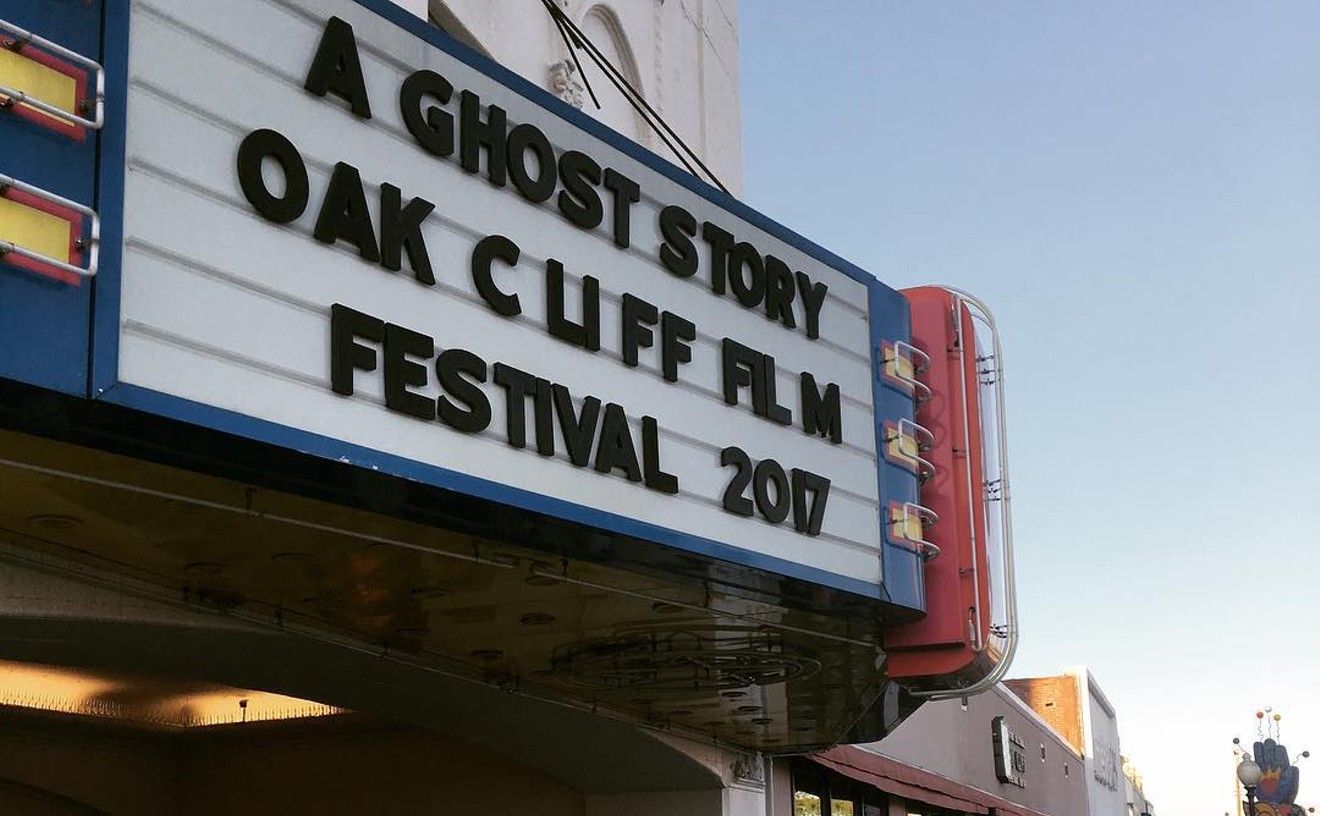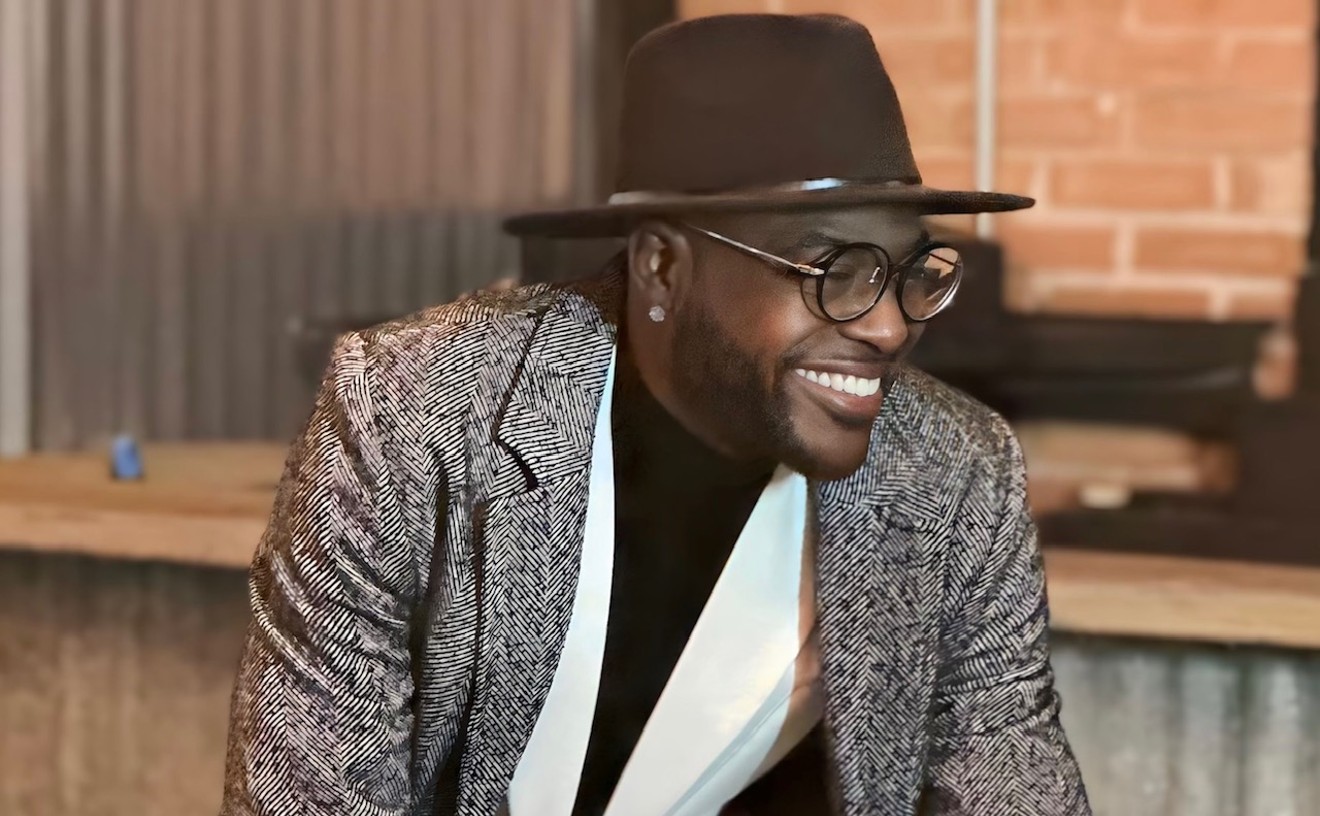In its area premiere at Kitchen Dog Theater, Hedwig gets the production devoted Hed-heads have been hoping for. In the lead is Joey Steakley, the Snyder, Texas, native last seen at KDT swinging from the rafters as transvestite circus performer Barbette. Steakley gives a spectacular performance as Hedwig, the East German songwriter whose botched sex change results in a gender identity betwixt and between. Wearing tall black leather dominatrix boots, tiny silver hot pants, a sequined tube top and a flowing platinum wig, Steakley struts like Tina Turner, pouts like Mick Jagger, wails like David Bowie's Ziggy Stardust and croons like Lou Reed.
Steakley, 23, owns this role and he seems to be loving every minute of it. He's a gorgeous creature, with slender gams that stretch as long as Marlene Dietrich's and hands that paw and grab the air like Judy Garland's. When he perches on a stool for the monologues, he sneers at the spotlight like a modern bitch goddess--a young Elaine Stritch under Christina Aguilera's "Lady Marmalade" makeup. Steakley's pale, delicate physique perfectly suits the girly-boy image of Hedwig. His formidable singing and acting make him nothing less than a theatrical heavyweight.
Backing up Steakley as Hedwig's band, The Angry Inch, are four terrifically talented young Dallas-area musicians: Stephen Shelton Kirkham, doubling on keyboard and guitars; Keenan Wayne Nichols, lead guitar; Clint Phillips, drums; and Jacob Weber, bass. Singing backup as Hedwig's "husband" Yitzhak is Laurie McNair, whose scowls and growls don't obscure a fine voice.
From the moment they hit the stage with the bitter introduction, "Ladies and gentlemen, whether you like it or not...Hedwig," Steakley and the band never let the energy flag. The blistering opening number (music and words by Stephen Trask) sets a frantic pace as Hedwig thrashes through lyrics that express her defiance. Like the Berlin Wall pre-1989, she says, she dares her enemies to "try and tear me down."
As Hedwig's "final concert" on her tour of chain steakhouses and cheap hotel lounges, the show unfolds in a series of flashbacks told through R-rated stories (written by the show's creator and first star, John Cameron Mitchell). She talks about her pre-op childhood and her adolescence as Hansel Schmidt, product of a runaway father and an emotionally distant mother. "When she touched me it was usually by accident," Hedwig recalls. The performance occasionally pauses so Hedwig can check on the stadium show next door, a sold-out pop extravaganza starring her ex-boyfriend, Tommy Gnosis, who has risen to stardom by stealing Hedwig's songs. (Big snaps to lighting and set designer Suzanne Lavender, sound designer Mark Griffin and director Tina Parker for creating a believable illusion of a huge concert venue just outside Kitchen Dog's back door.)
With intentionally crude slides of childish drawings illustrating each scene, Hedwig staggers through her saga. The first 45 minutes of Hedwig and the Angry Inch are talky, but much of Hedwig's rant is divinely decadent, as Sally Bowles would say. Let's listen in: "One day in the late mid-'80s...I was in my early late 20s. I had just been dismissed from university after delivering a brilliant lecture on the aggressive influence of German philosophy on rock and roll, entitled: 'You, Kant, Always Get What You Want.'"
Eventually, Hedwig falls for an American GI, suffers the surgery that takes her "six inches forward, five inches back" and ends up broke and abandoned in a trailer near a Midwestern army base. She mentors and seduces Tommy, the cute, Jesus-freaky Army brat next door. She teaches him rock and roll guitar and writes powerful songs that he'll pirate and pulverize Michael Bolton-style for mass consumption.
In song and story, Hedwig explores the pain of her split self. She spins out ideas about human sexuality drawn from Plato, Adam and Eve, Greek myths and biology. She offers her own fanciful theory of the evolution of human sexuality from the perspective of someone who's ridden on both ends of the genetic teeter-totter. The ballad "The Origin of Love" explains the fine points. She also takes well-deserved shots at vapid musical icons Toni Tennille, Debby Boone and Phil Collins, and sends up the onstage antics of heavy metal groups and punk bands.
Until nearly the end of her concert, Hedwig keeps searching for her "other half," the entity she believes will make her whole. Then in a flash of theater magic, Tommy Gnosis appears, and he and Hedwig merge in the haunting song "Wicked Little Town." The message: We're all whole just as we are.
In this moment and throughout the 90-minute show (no intermission), Joey Steakley is absolutely stunning. His is a performance that will only get stronger as the run continues. On opening night, he fumbled the timing of a few jokes and seemed the tiniest bit timid about interracting with the audience during the monologues. Steakley needs to trust his own performance and realize that he's so good, the audience will go anywhere he takes them.
The difference between this rock musical and all other shows claiming to be rock musicals, including Rocky Horror and Hair, is that Hedwig has both a good story line and a score packed with big, subversive, angry songs infused with the real spirit of rock. Trask's score for Hedwig is nasty, loud, funny, ironic, touching and memorable. There is more tragedy and grandeur in the book and score for Hedwig than in Rent, or in that granddaddy of all rock musicals, Jesus Christ Superstar. The rap on the Music Hall at Fair Park is always about the sound system. With most shows there, the over-amplified, over-miked sound comes out fuzzy, tinny or so badly balanced the audience is left guessing who's singing where and what they're singing about.
Miraculously, the sound is just right for the road tour production of Flower Drum Song, now winding up two weeks at Fair Park. Every word, every note is clear, and for once the fine pit orchestra doesn't threaten to drown out the chorus. Good thing, too, because the cast of this late-'50s musical about Asian immigrants in San Francisco is topnotch. With its new book by David Henry Hwang, the show seems fresh and relevant. The music remains some of the best in the Rodgers and Hammerstein ouevre.
Another oldie but not so goodie, Sly Fox, by legendary comedy writer Larry Gelbart, is onstage at Theatre Three. Gelbart, famous for writing the M*A*S*H TV series, updated the play Volpone about a greedy miser pretending to die to extract more loot from his friends and relatives. Sly Fox feels creaky now, and at the matinee performance reviewed, the cast, led by Larry O'Dwyer doing a Charles Coburn turn as Foxwell J. Sly, didn't help matters by performing with Chekhovian lethargy. Comedy turns to mincemeat when the energy drags, and this bunch made entrances and exits like they were wearing cast-iron shoes. The urge to nod off was almost overwhelming. Perhaps I should have. Some snoring might have awakened the actors.










